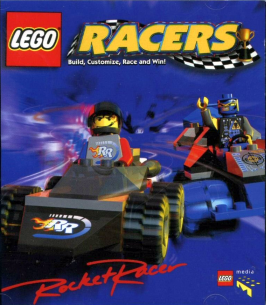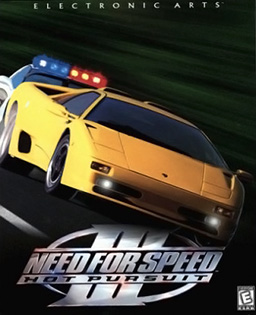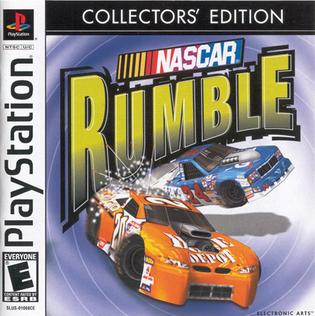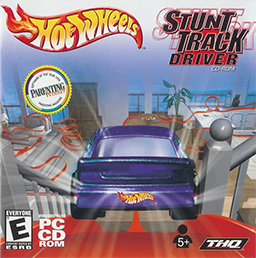
F-Zero X is a 1998 futuristic racing video game for the Nintendo 64 console, developed and published by Nintendo. It is a sequel to the original F-Zero (1990), and is the first F-Zero installment with 3D graphics. The game has a steep learning curve and its gameplay experience is similar to that of the original. An Expansion Kit, including a track and vehicle editor, was released in Japan in 2000.

Hi-Octane is a 1995 vehicular combat and racing video game published by Electronic Arts for MS-DOS, PlayStation, and Sega Saturn. It was developed by Bullfrog Productions based upon their earlier Magic Carpet game code. The tracks are wider and more open than most racing games. Hi-Octane was not as well received as the thematically similar Wipeout by Psygnosis and was criticized for the short view distance. Bullfrog also released an expansion pack with three new tracks and new game modes.

Need for Speed: High Stakes, released as Need for Speed: Road Challenge in Europe, is a 1999 racing video game developed by EA Canada and EA Seattle and published by Electronic Arts for the PlayStation and Microsoft Windows. It is the fourth game in the Need for Speed series and a follow-up to Need for Speed III: Hot Pursuit. The game features more realistic elements than its predecessors and introduced a damage system that allows cars to take damage when colliding with objects, affecting their appearance and performance. It also introduced a series of economy-based tournaments, awarding players with a cash prize that can be spent on repairing, purchasing, or upgrading cars for subsequent races. The game's Hot Pursuit mode, which was introduced in Hot Pursuit, was expanded with more options, allowing players to control police pursuits attempting to stop racers.

Lego Racers is a 1999 Lego-themed kart racing video game developed by High Voltage Software and published by Lego Media for Microsoft Windows, followed by console ports to Nintendo 64 and PlayStation. Set in the fictional "Legoland" universe, the single-player mode follows various minifigure characters competing in a racing competition created by a fictional racing champion called Rocket Racer.

Need for Speed III: Hot Pursuit is a 1998 racing video game developed for PlayStation by EA Canada and Microsoft Windows by EA Seattle, and published by Electronic Arts. It is the third major installment in the Need for Speed franchise, incorporating police pursuits as a major part of gameplay. Hot Pursuit remains focused on racing using exotic sports cars, but features races that primarily take place in locations within North America, including varied settings and climates. Police AI is improved over the first game, utilizing several tactics to stop both the player and opponent. The PlayStation version was released on March 25, 1998, while the Windows version was released on October 12 the same year. The game received critical success, with praise for its graphics and customization options. It received a direct sequel in 2002 and a reboot in 2010.

Ford Racing 3 is a racing video game published by Empire Interactive, 2K, and ZOO Digital. It is the third game in the Ford Racing series, and was released in Europe in October 2004, for Microsoft Windows, PlayStation 2 and Xbox. In the United States, the game was released on the same platforms the following year, followed by releases later that year for the Game Boy Advance and Nintendo DS. Visual Impact Productions developed the GBA and DS versions, while Razorworks developed the other versions. The game received mixed reviews, critics were divided in its soundtrack, physics and overall content and gameplay.

Lego Racers 2 is a Lego-themed racing video game developed by Attention to Detail, published by Lego Software and distributed in North America by Electronic Arts. It was first released in September 2001 for Windows, PlayStation 2 and Game Boy Advance. It is the sequel to the 1999 game Lego Racers. This sequel was first revealed by Lego Software on August 20, 2001.

Hot Wheels Turbo Racing is a racing video game released for the Nintendo 64 and PlayStation in 1999. It features 40 cars based on the Hot Wheels series of toys. It also features Kyle Petty's 1999 NASCAR stock car, as it was sponsored by Hot Wheels. The game features music from artists like Primus, Metallica, The Reverend Horton Heat and Mix Master Mike.
Micro Machines is a series of video games featuring toy cars, developed by Codemasters and published on multiple platforms. The series is based on the Micro Machines toy line of miniature vehicles.

Hot Wheels Turbo Racing is a racing video game released for the Nintendo 64 and PlayStation in 1999. It features 40 cars based on the Hot Wheels series of toys. It also features Kyle Petty's 1999 NASCAR stock car, as it was sponsored by Hot Wheels. The game features music from artists like Primus, Metallica, The Reverend Horton Heat and Mix Master Mike.

NASCAR Rumble is a racing video game created by Electronic Arts for the PlayStation. Players race through 18 different courses set in six different areas collecting powerups to aid them. The game is a departure from many NASCAR games, as it is an arcade racer featuring various tracks and Mario Kart-esque powerups. A non-NASCAR licensed sequel was made for the PlayStation 2, called Rumble Racing. There are drivers from the then Winston Cup Series and Craftsman Truck Series, as well as legend racers and bonus vehicles.

Hot Wheels Stunt Track Driver is a racing video game developed by Semi Logic Entertainments and published by Mattel Media for Microsoft Windows. It is based on the Hot Wheels toy franchise, and was released on October 15, 1998. A Game Boy Color version, developed by Lucky Chicken Games, was released in 2000.

Micro Machines V4 is a racing video game developed by Supersonic Software and published by Codemasters for Microsoft Windows, PlayStation 2, PlayStation Portable and Nintendo DS.

Moto Racer Advance is a motocross racing game developed by Adeline Software International, produced by Delphine Software International and published by Ubisoft for the Game Boy Advance. It was released in 2002 in PAL regions on October 4 and in North America on December 4. It is part of the Moto Racer series and was the last game to be developed by Adeline Software and also the last with any involvement from Delphine Software.

Toy Story Racer is a 2001 kart racing game developed by Traveller's Tales and Tiertex Design Studios and published by Activision. It was based on the Toy Story franchise, primarily the first film. The game was released in March 2001 for the Game Boy Color and PlayStation systems. The PlayStation version received "generally favorable reviews" according to Metacritic. In 2010, the PlayStation version was re-released on the PlayStation Store as a PS one Classic.

Ford Racing is a racing video game published by Empire Interactive for Windows and the PlayStation video game console. The computer version was developed by Elite Systems and released on November 2, 2000, while the PlayStation version was developed by Toolbox Design and released on January 29, 2001.

Hot Wheels Ultimate Racing is a 2007 racing video game developed by Italian company Raylight Studios and published by DSI Games for the PlayStation Portable (PSP) exclusively. The game is based on the Hot Wheels toy line which manufactured by Mattel.

Beetle Crazy Cup, released as Beetle Buggin' in North America, and as Käfer Total in Germany, and as Radiсal Drive in Spain, is a 2000 racing video game developed by Xpiral and published by Infogrames for Microsoft Windows. The game features vehicles by Volkswagen as part of a licensing deal between Infogrames and the automotive company.

Off Road is a 2008 racing video game developed by Razorworks and published by Xplosiv. It is the seventh and final game of the Ford Racing series. It is also the only game in the series to feature vehicles by Land Rover, which was owned by Ford Motor Company at the time. The game was released for the personal computer (PC), PlayStation 2 (PS2), PlayStation Portable (PSP), and the Nintendo Wii. The game received mostly negative reviews.

Swamp Buggy Racing is a racing video game developed by American studio Daylight Productions and published by WizardWorks for Microsoft Windows. The game was released in the United States in January 2000, and received negative reviews.


















